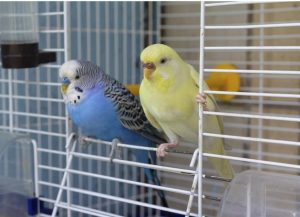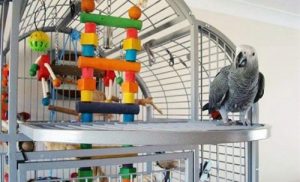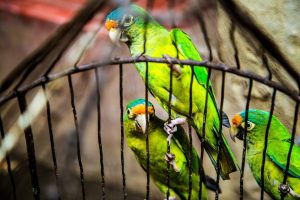Parrots are intelligent, social, and highly engaging pets that thrive on routine, attention, and the right care. Whether you’re a first-time parrot parent or a seasoned bird lover, having a structured daily care routine is essential to ensure your feathered friend remains happy, healthy, and well-adjusted. In this blog post, we’ll explore a comprehensive daily care checklist tailored to the unique needs of parrots.
1. Morning Greeting and Check-In Start the day by gently greeting your parrot. This simple interaction sets a positive tone and helps your bird feel secure. Take a moment to observe their behavior and physical condition. Signs of illness in parrots include fluffed-up feathers, changes in droppings, lethargy, or lack of appetite.
Checklist:
- Greet your parrot with a calm voice
- Visually check for signs of illness or injury
- Monitor activity levels and vocalizations
2. Clean Food and Water Bowls Fresh, clean food and water are fundamental to your parrot’s well-being. Parrots can be messy eaters, so bowls should be cleaned and refilled daily to prevent bacterial growth and ensure proper nutrition.
Checklist:
- Remove and wash food and water bowls with warm, soapy water
- Provide fresh, clean water
- Replace food with a healthy mix of pellets, fruits, and vegetables
3. Nutritious Breakfast Just like humans, parrots benefit from a nutritious breakfast to kickstart their metabolism. Offer a balanced mix of high-quality pellets, bird-safe fruits, and vegetables.
Checklist:
- Serve fresh, bird-safe produce like apples (no seeds), carrots, or leafy greens
- Avoid avocado, chocolate, caffeine, and salty foods
- Rotate fruits and veggies to provide variety and balanced nutrition
4. Cage Cleaning and Maintenance A clean cage is essential to your parrot’s health. Droppings, leftover food, and feathers can accumulate quickly and create an unhealthy environment.
Checklist:
- Remove droppings from perches and tray
- Change cage liner or paper
- Wipe down bars, toys, and perches
- Ensure food isn’t spoiled or hidden away
5. Social Interaction and Bonding Time Parrots are social creatures that need daily interaction with their human companions. Lack of attention can lead to behavioral issues like screaming, feather plucking, or aggression.
Checklist:
- Talk to or sing to your parrot
- Spend at least 30-60 minutes of hands-on interaction
- Include games like peek-a-boo, target training, or mimicking sounds
6. Out-of-Cage Time and Exercise Physical activity is crucial for maintaining a healthy weight and reducing boredom. If safe, allow your parrot supervised time outside the cage daily.
Checklist:
- Parrot-proof the room to eliminate hazards
- Allow your bird to fly, climb, or explore
- Provide play gyms or hanging toys
7. Mental Stimulation and Enrichment Parrots are highly intelligent and can become bored quickly. Mental stimulation prevents destructive behaviors and keeps your bird happy.
Checklist:
- Rotate toys regularly to maintain interest
- Introduce foraging toys with hidden treats
- Teach simple tricks or commands
8. Grooming and Hygiene Good grooming helps parrots feel comfortable and prevents health issues. Some birds enjoy misting or showers, while others may need their beak or nails gently trimmed.
Checklist:
- Offer a shallow water dish or mist with clean spray bottle
- Check nails, beak, and feathers for overgrowth or damage
- Avoid using human grooming products
9. Evening Wind-Down and Security As the day ends, help your parrot settle down with a consistent evening routine. Parrots need 10-12 hours of uninterrupted sleep in a dark, quiet environment.
Checklist:
- Dim lights and reduce noise levels
- Cover the cage with a breathable fabric (optional)
- Say goodnight with calm, soothing words
10. Keep a Daily Log (Optional but Helpful) Tracking your parrot’s habits and health can help catch early signs of illness and support vet visits.
Checklist:
- Note changes in eating, behavior, droppings
- Record weight (if possible)
- Document any unusual behavior or symptoms
Final Thoughts A daily parrot care routine not only ensures your bird’s physical and emotional well-being but also strengthens the bond you share. With consistency, love, and a little extra attention, your parrot can thrive in a safe and happy home. Bookmark this checklist or print it out to make sure you never miss a step in keeping your vibrant companion in top shape!
For more tips, species guides, and parrot care articles, visit joeparrots.com regularly!



